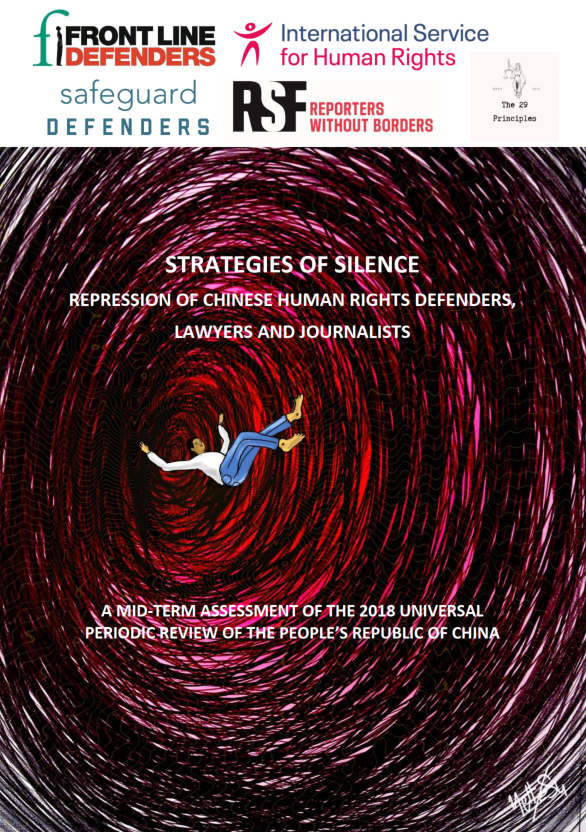Strategies of Silence - Joint Report on China's UPR commitments
 Exposé to UN UPR on the widespread and systematic use of incommunicado detention, enforced disappearances and a growing array of regulations, policies and practices in the People’s Republic of China, aimed at silencing Chinese human rights defenders, lawyers and journalists, as well as deterring others from speaking up and promoting fundamental rights and freedoms.
Exposé to UN UPR on the widespread and systematic use of incommunicado detention, enforced disappearances and a growing array of regulations, policies and practices in the People’s Republic of China, aimed at silencing Chinese human rights defenders, lawyers and journalists, as well as deterring others from speaking up and promoting fundamental rights and freedoms.
1 December 2021 - Safeguard Defenders, International Service for Human Rights, Reporters Without Borders, Frontline Defenders and The 29 Principles are today releasing their joint mid-term report to the Universal Periodic Review (UPR) on the People’s Republic of China. Download the report here or find it under Publications.
The UN Universal Periodic Review (UPR) is the principal international mechanism to facilitate the examination of a country’s human rights record every five years. In November 2018, the Government of the People’s Republic of China (PRC) underwent its 3rd Universal Periodic Review (UPR), receiving a number of recommendations from other UN Member States to stop arbitrarily detaining human rights defenders, lawyers and journalists, and to amend laws and practices that restrict the fundamental freedoms underpinning their ability to operate freely and to exercise the right to defend others’ rights.
Though they rejected some of these recommendations, the PRC government accepted a majority of recommendations and identified them as ‘already implemented’, including many addressing civil and political rights concerns. This was a departure from standard UN practice – but more importantly, an inaccurate description of the situation on the ground.
Therefore, while the PRC will not be submitting a mid-term report to the UPR process as some other Member States voluntarily choose to do, the above five human rights organizations deem it adamant to provide an up-to-date insight into the situation on the ground as to expose the continuous deterioration of minimal human rights safeguards within the PRC and provide adequate information to the other UN Member States.
Independent research points to evidence that the Chinese government is making systematic and widespread use of an array of “legal” provisions to detain and disappear defenders, as well as allowing the continuation of regulation, policy and practice that de facto deprive them of any possibility to engage in human rights activities. The criminalisation of human rights defenders aims not only to silence dissenting voices, but also to deter others from speaking up and promoting fundamental rights and freedoms.
This joint report consolidates such research to shed light on the misuse of ill-defined national security provisions, carrying long prison terms and allowing for restrictions to due process under China’s Criminal Procedure Law, to arbitrarily detain defenders, criminalize their free speech and assembly, and severely restrict their movement.
Other – less visible, but no less repressive – tactics are rooted in administrative measures and regulations and have been used to suspend or revoke human rights lawyers’ professional licenses. Of particular concern is the growing widespread and systematic use of incommunicado detention and enforced disappearances against human rights defenders, lawyers and journalists, especially under Criminal Procedural Law provisions allowing for ‘Residential Surveillance at a Designated Location’ (RSDL). These laws and practices are not only inconsistent with international standards and China’s obligations under international human rights law, but also run contrary to the PRC’s own Constitution.
The human rights violations described in this report, whether justified in law or ignored in practice, result in a cumulative harmful impact on human rights defenders, lawyers and journalists. This is not only a question of the respect (or lack thereof) of civil and political rights; the behaviours of Chinese authorities also lead to economic insecurity and frequently harm human rights defenders’ and their family’s enjoyment of their rights to housing, adequate food, education, physical and mental health, work, religious and cultural practices, and the right to a family life, including the rights of the child.
The report concludes with a series of priority steps the PRC Government should take to improve implementation of human rights protections by its next UPR cycle (expected to take place in 2023), as well as other recommendations to States and UN mechanisms.
Safeguard Defenders' original submission to the Universal Periodic Review of China (3rd cycle) can be found here, or under the Publications tab.